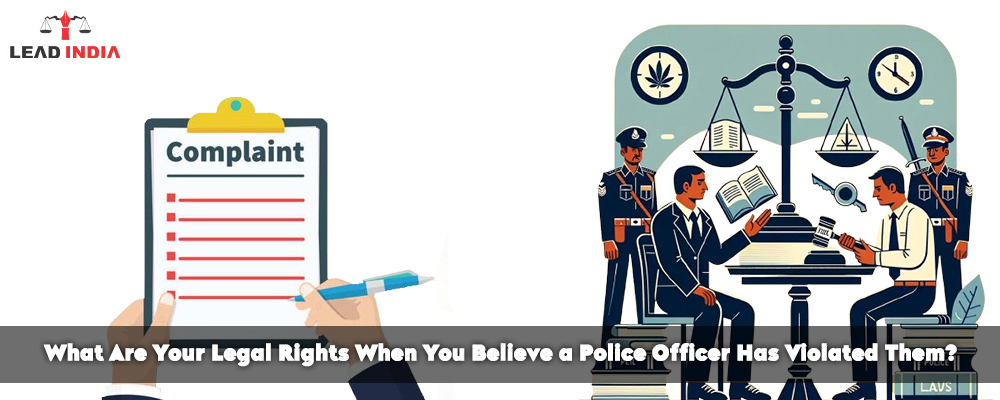Every Indian resident is guarantee certain legal rights which protect them from tyrannical practices, such as corruption within law enforcement agencies. Such rights are derive from the Indian Constitution, and various statutory laws.
Legal Rights against Police Misconduct: Indian Constitution
- Equality Before Law (Article 14): Article 14 provides for the equal protection of laws to every citizen of India. It guarantees that everyone will stand equal in the eyes of law and discrimination of any sort based on status will not be allow. This right is violate when, for example, police officials act in a biased manner or misuse their powers.
- Life and Personal Liberty (Article 21): Article 21 of the Constitution states that no person shall be deprive of his life or personal liberty except according to procedure established by law. This right includes the right to be safe from the threat of or injury from, violence, as well as from wrongful confinement. Any police action that puts any person’s right to life, liberty, and dignity at stake, is in disobedience to the provisions of Article 21.
- Protection Against Self-Incrimination (Article 20(3)): Due to the provision that has been include in the constitution, a person cannot be force to testify against himself. This freedom is violate when the state takes measures that force an individual to admit to a fact culpable to the person.
- Right to Legal Aid and Fair Trial (Article 22): The Constitution provides in Article 22, that any individual who is arrested must be inform of the grounds for his arrest and also given an opportunity to consult a legal practitioner of his choice. This right guarantees that the accused has access to legal counsel and protects against arbitrary arrest.
Need A Legal Advice
The internet is not a lawyer and neither are you. Talk to a real lawyer about your legal issue

Legal Rights against Police Misconduct: Bhartiya Nagarik Nyaya Sanhita
- Right to Consult a Lawyer (Section 38 BNSS): During questioning, anyone who has been arrest has the right to speak with the advocate of their choice. This guarantees the accused is not subject to unnecessary pressure or illegal coercion.
- Right to Be Inform of the Grounds of Arrest (Section 47 BNSS): The arresting officer will ensure that the arrest individual will be inform of the reason for the arrest at the earliest possible moment.
- Right to Bail in Bailable Offenses (Section 48 BNSS): An arrested individual is entitle to seek release on bail, provide the crime committed is bailable. The police shall communicate this to them.
- Right to a Medical Examination (Section 53 BNSS): Whenever an individual is detain, he or she has the right to be examine for injuries by a qualified physician and for the physician to record the findings. This provision is essential in curbing torture in places of detention.
Legal Remedies for Police Misconduct
- Filing Grievance with Police against Policing Agency: In the event of any impropriety committed by the police, the victims may approach the DCP or the SP. Alternatively, such complaints can also be make before the State Police Complaints Authority, which has the power to investigate claims of police wrongdoing and make suggestions on disciplinary action.
- Writ Petition: To seek redress for a violation of basic rights, people may file a writ petition in the Supreme Court under Article 32 or in the High Court under Article 226. A writ of habeas corpus can be issue to secure the release of an individual who has been unlawfully detain in circumstances of torture or illegal incarceration.
- Public Interest Litigation (PIL): To address the larger issues, a PIL may be brought in the Supreme Court or High Court when police misbehavior impacts a group of persons or the general public.
- Filing a Petition in a Magistrate’s Court: In the event of any police misconduct, a person can file a private complaint in a Magistrate’s Court. The magistrate may also issue directions for the filing of a First Information Report (FIR) against the erring policeman.
- Approaching Human Rights Commissions: The objective of the State Human Rights Commissions (SHRC) and National Human Rights Commission (NHRC) is redressal of the violations commit with respect to the rights of the state citizens, for example, violent police action, torture in custody, etc. These commissions which have powers to recommend investigation, award compensation, or instigate prosecution, can accept such complaints directly.
- Compensation through Civil Suits: Where there is an infraction of an individual’s fundamental rights and such individual suffers because of police action, civil remedy of damages may be sought. The courts have awarded damages in several cases for false imprisonment, torture or death in custody.
- Filling of Criminal Charges: Police authorities may be hold criminally liable in accordance with the Bhartiya Nyaya Sanhita for such offenses as wrongful confinement (Section 127), causing harm (Section 115 (2)), and causing grievous harm (Section 117 (2)). Section 105 (murder of a culpable degree) may apply to situations where death occurs in the course of a person being hold in custody.
One can talk to lawyers from Lead India for any kind of legal support. In India, free legal advice online can be obtaine at Lead India. Along with receiving free legal advice online, one can also ask questions to the experts online free through Lead India.





 Talk to a Lawyer
Talk to a Lawyer